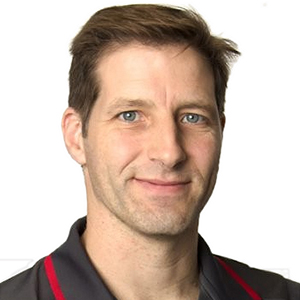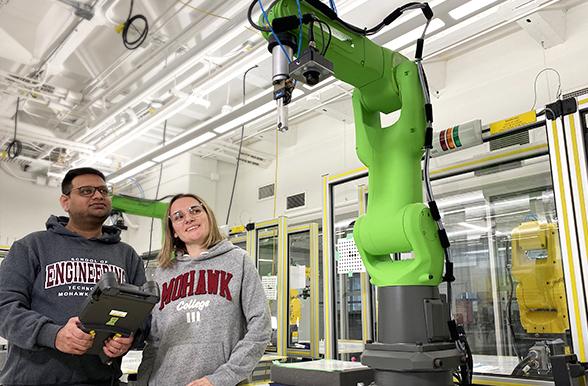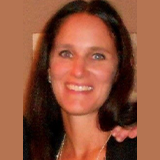Electrical Engineering Technology - 582
Overview
Program Highlights
- Co-op term is one year in length — a format that is widely preferred by employers and students alike.
- Practical and real-life experience through applied research projects.
What you'll learn
- Explore the electrical control and power systems field through training in theory and laboratory practice.
- Principles and knowledge of Electrical and Electronic systems
- Programmable Logic Controllers and Industrial Network systems
- Control systems and Variable Speed Drive systems
- Electrical Power Generation, Protection and Control systems
- Electrical Metering and Distribution
Students in this program will gain hands-on, experiential learning with industry partners in a decommissioned substation.
Program Length
3 academic years (periods of 8 months), plus co-op
Admission
Admission
Domestic and International student admission requirements
- OSSD or equivalent (Mohawk Academic Upgrading, GED) including:
- Grade 12 English, C or U or equivalent
- Grade 12 Mathematics; MAP4C ≥ 80% or MCT4C; or any U or equivalent
Options are available for mature applicants.
Language Requirements for Applicants with English as a Second Language
- See below for accepted equivalents for Grade 12 English:
- Successful completion of the GAS-English for Academic Purposes (478) program
- TOEFL minimum score of 550 (80 Internet based)
- or IELTS Academic minimum score of 6.0 overall with no band less than 5.5
- More information about acceptable certificates, can be found on the International Admission Requirements
Applicants whose first language is not English will be required to demonstrate proficiency in English.
Don't have the necessary requirements?
Tuition and Fees
Tuition and Fees
2024 - 2025 Domestic Tuition and Fees
| Description | Semester 1 | Semester 2 |
|---|---|---|
| Compulsory Ancillary Fees | $881.96 | $785.16 |
| Co-op Fees | $316.67 | $331.06 |
| Compulsory Program Fees | $0.00 | $0.00 |
| Domestic Tuition | $1,354.04 | $1,354.04 |
| Total Domestic Charges Per Semester | $2,552.67 | $2,470.26 |
| Total 1st Year Fees | $5,022.93 | |
Above fees based on full-time September program start date. Contact Student Services to confirm fees for other start dates or semesters.
- Full Cost Breakdown
- Explore payment options
- Book costs for your program can be found through the Campus Store
- You will also be required to purchase a program-specific lab kit each semester of your program. Full details will be provided in your classes. This is an additional cost (above tuition/ancillary fees and textbooks).
2024 - 2025 International Tuition and Fees
| Description | Semester 1 | Semester 2 |
|---|---|---|
| Total Tuition & Ancillary Fees | $8,525.00 | $8,525.00 |
| Co-op Fees | $316.67 | $331.06 |
| Program Compulsory Fees | $0.00 | $0.00 |
| International Tax Recovery | $450.00 | $375.00 |
| Total International Charges Per Semester | $9,291.67 | $9,231.06 |
| Total 1st Year Fees | $18,522.73 | |
If you pay by wire transfer, please note your bank might charge you a fee to transfer money. Make sure your transfer includes the Mohawk payment and the wire transfer fee. This applies to each wire transfer payment you make.
- Explore payment options
- Book costs for your program can be found through the Campus Store
- You will also be required to purchase a program-specific lab kit each semester of your program. Full details will be provided in your classes. This is an additional cost (above tuition/ancillary fees and textbooks).
Additional Information
Financial Assistance
Financial Assistance
When it comes to paying for your education, investing in your future can be more affordable than you think. A Mohawk education is one of the most cost-effective means of acquiring the skills and knowledge you need to have a prosperous and rewarding career.
As you start on your chosen career path, it's important to have a realistic set of expectations regarding the expenses associated with attending college. In addition to your tuition fees, you will also need to budget for books, supplies, housing, and other related living expenses. You may be able to supplement your income and savings with scholarships, bursaries, or loans. It pays to do some research into what types of financial assistance you may qualify for.
Available Financial Assistance Resources:
 OSAP Eligible. Learn about Ontario Student Assistance Program - OSAP (domestic students only)
OSAP Eligible. Learn about Ontario Student Assistance Program - OSAP (domestic students only)- Working on Campus
- Additional Sources of Funding
- Financial Assistance Home Page
Apply for Awards:
By submitting a Scholarships and Bursaries Application every semester, students have access to over $3 million in Mohawk College scholarships, bursaries and Ministry-partnered funding to help meet their financial needs.
Financial Literacy:
Whether saving for school, sticking to a budget, or planning for a major purchase, financial literacy affects us all. That's why Mohawk College is dedicated to helping students improve their financial literacy and become more confident in managing their money.
- Complete the free online Money Matters Module to earn Co-Curricular Credit!
- Financial Resources and Calculators
Program of Studies
Course Overview & Descriptions
Click on the course title for a course description.
Experiential Learning
Experiential Learning
How you’ll gain skills
- Working on applied research projects with industry partners.
- Gain valuable experience during co-op work terms.
- Apply cumulative program knowledge through a capstone research project.
This co-op program has been accredited by CEWIL Canada. This represents the highest standard of achievement for co-op programs in Canada.
To learn more, please visit the Centre for Experiential Learning.
Co-op Format
| September to December | January to April | May to August |
|---|---|---|
| Semester 1 | Semester 1 or 2 | Vacation or Semester 2 |
| Semester 3 | Semester 4 | Work Term 1 (Co-op) |
| Semester 5 | Work Term 2 (Co-op) | Work Term 3 (Co-op) |
| Work Term 4 (Co-op) | Semester 6 |
Learn more about Electrical Engineering Technology
Co-op Delivery and Fees
This program has a mandatory co-op, as part of the program of study. The annual co-op fee structure can be found on the Tuition and Fees page.
For questions, please contact the Co-op Specialist listed at the bottom of the webpage.
Driver’s License and Vehicle
Please note that some co-op positions for this program require that students have a valid driver’s license and access to a vehicle. The license requirement (G class, G2 class) varies by position. Some co-op positions may require students to commute.
Co-op Designation
This program offers four co-op work term opportunities but requires two completed co-op work terms for the co-op designation.
Work Term Capabilities
(which do not reflect individual work experiences & exposures)
Work Term 1
- Design, construction, testing, installation and preventative maintenance of computer and electronic equipment
- Use instrumentation equipment such as signal generators, oscilloscopes, digital measuring equipment
- Installation, troubleshooting and repair of computer hardware & software
- Prototype development for microcontroller applications
- Microcontroller interfacing and programming using C and Assembly languages
- Digital and analogue circuits design and troubleshooting
- Experience with industrial logic and sensors, and 3-phase motor and control
- PLC programming and implementation, Industrial electronics
- Printed circuit board layout and construction
- Technical support, field service, component sourcing and purchasing
- Technical writing
- Small scale construction projects & use of tools
Work Terms 2, 3 & 4
- Computer aided drafting
- Computer network design, installation, maintenance and management
- Fixed speed AC and DC motor control systems analysis, testing and troubleshooting
- Evaluation testing and modification of electrical systems and metering
- Evaluation, testing and modification of industrial automation systems
- Design, test and modify variable speed AC and DC drive systems
- Analyse, test & design closed loop industrial control systems using analog and digital elements
- Evaluate, test and modify closed loop process control systems
- Design, testing, installation and maintenance of plant automation and control equipment
- Use instrumentation equipment such as signal generators, oscilloscopes, digital measuring equipment on industrial equipment
- Prototype development in industrial electronics
- Interpretation and analysis of electrical/electronic power
- Protection and control system schematics
- System modifications and schematic preparation
- Protection co-ordination and evaluation
- Polyphase meter and protective relay calibration
- Digital control equipment design & support
- Technical writing
| Co-op Pay Range | Co-op Pay Average |
|---|---|
| Range: $17.20 - $29.00 | Average: $22.00 |
For further information, please contact:
Rachel Alfano, Co-op Specialist
Phone: 365-226-0018
Email: rachel.alfano [at] mohawkcollege.ca (Rachel Alfano)
Learning Outcomes
Learning Outcomes
Program Learning Outcomes, often referred to as ‘Program Standards', set out the essential learning that a student must achieve before being deemed ready to graduate.
In many cases these program learning outcomes were developed by the Ministry of Colleges and Universities (MCU) in consultation with employers and educators who are experts in the program field. To ensure the outcomes remain current and in line with industry needs, we invite our employers, graduates working in the field and current students to re-examine and update them during regular, ongoing program review focus groups.
Career Opportunities
Career Opportunities
Your future career options
- Electrical Engineering Technologists
- Industrial Engineering and Manufacturing Technologists/Technicians
- Power-Transmission/Distribution Engineering Technologists/Technicians
- Power-Protection Engineering Technologists
Where you could work includes:
- Industrial and Commercial Organizations
- Automotive, Food and Steel Industries
- Power Generations, Transmissions and Utilities
- Process Automation, Oil Refineries and Chemical Plants
Opportunities for grads
- Graduates may be eligible to be registered as associate members of The Ontario Association of Certified Engineering Technicians and Technologists (OACETT).
- FANUC Certification Level 1, Handling Tools and Operation.
- Eligible to apply for Limited Licence with Professional Engineers Ontario (PEO).
Educational Pathways
Educational Pathways
Pathways to Mohawk
If you've successfully taken a course at another post-secondary institution, you may be able to earn course exemptions toward your credential here at Mohawk.
Please note the common core
There is a common core, semesters 1 to 4 for Electrical Engineering Technology and Energy Systems Engineering Technology, whereupon you enter semester 5 for Energy Systems Engineering Technology.
If you have successfully completed one of the following programs at Mohawk, you may be eligible to receive transfer credit in this program. To start a new program at Mohawk, you must apply via ontariocolleges.ca.
Transfer from
You can transfer to the Electrical Engineering Technology - 582 from the following programs:
Pre-Technology
Electrical Engineering Technician - Power
Electrical Engineering Technology
Energy Systems Engineering Technology
Receiving Program
Electrical Engineering Technology
Credit transfer agreements have been arranged to make it easier for students to move from Mohawk to another institution.
Transfer From Electrical Engineering Technology To
Athabasca University
1 University Dr
Athabasca AB T9S 3A3
Canada
Bachelor of Science - PD
Bachelor of Science - PD with Majors:
- Applied Mathematics
- Computing Information Systems
- Human Science
1 University Dr
Athabasca AB T9S 3A3
Canada
McMaster University
1280 Main Street West
Hamilton ON L8S 4L8
Canada
- Bachelor of Technology - Power and Energy Engineering Technology
- Bachelor of Technology - Software Engineering Technology
- Bachelor of Technology - Manufacturing Engineering Technology
1280 Main Street West
Hamilton ON L8S 4L8
Canada
Technological University of the Shannon
University Road
Athlone
Co. Westmeath
N37 HD68
Ireland
- Bachelor of Engineering (Honours) Electrical Engineering
- Bachelor of Engineering (Honours) Renewable and Electrical Energy Engineering
- Bachelor of Engineer (Honours) Industrial Automation & Robotics Systems
University Road
Athlone
Co. Westmeath
N37 HD68
Ireland
Mohawk College makes every effort to ensure the accuracy of each transfer opportunity. Please note that changes may occur in program offerings, admission requirements, and transfer credits granted by the receiving institutions. We advise all students to check with the receiving institution directly for the most up-to-date information.
Don’t see what you’re looking for? Search ONTransfer.ca for more pathways with Ontario public colleges and universities.
Mohawk College makes no warranty or endorsement of material contained within links to external websites, nor does the College assume any responsibility for the linked website or its contents.
Faculty
- Semesters 1 to 4 questions: vijay.khatri [at] mohawkcollege.ca (Contact Vijay Khatri)
- Semesters 5 to 6 questions: stephen.eagle [at] mohawkcollege.ca (Contact Stephen Eagle)

Associate Dean: john.van-loon [at] mohawkcollege.ca (John Van Loon)
Program Coordinator

Vijay Khatri
Stephen Eagle
Faculty
Contact Us
Contact us
Domestic Canadian Students
Contact Student Recruitment
Haven’t applied yet and have questions?
Contact our Student Recruitment team for information on programs, how to apply, and more.
Contact Admissions
Contact our Admissions advisors for help with your application.
Contact Admissions
Phone: 1-844-767-6871
International Students
Contact International Student Recruitment
Contact our International Student Recruitment team for information on programs, how to apply, and student life.
Contact International
Email: intl.representatives@mohawkcollege.ca
Phone: 1-905-575-2254
Toll free phone numbers:
For general questions: 1-888-Mohawk9 (1-888-664-2959)
North China: 10-800-714-2521
South China: 10-800-140-2541
Brazil: 0800-022-7408
Philippines: 180011102544
Contact International Admissions
Contact our Admissions advisors for help with your application.
Contact International Admissions
Phone: 1-905-575-2254
*Not all programs are international eligible. Please see our programs available for international students.
Accessible Learning Services
Are you a student with a confirmed or suspected disability? Visit our Accessible Learning Services website to discover how we can help you.
Program Coordinator
- Semesters 1 to 4 questions: Contact Vijay Khatri
- Semesters 5 to 6 questions: Contact Stephen Eagle

Associate Dean: John Van Loon

Vijay Khatri
Stephen Eagle
Engineering a childhood spark into a dream career
Career Profile - Motion Control Production Manager
CHCH News: New robotics for Mohawk College
We're here to help
We’re here for you to support applications and admissions by providing online and virtual service.
Applied and have questions?
The admissions team is available to help, you can contact them via Admissions or by phone at 1-844-767-6871.
Haven’t applied and need help?
Contact us or phone 1-844-767-6871.
Take a virtual campus tour
Explore Mohawk College from the comfort of home! Our virtual campus tours provide a guided visit of our buildings, labs, services, classrooms and athletic and recreation centre.
Program delivery
Learn about program delivery terms.
Please note: in-person, virtual, and hybrid classes vary according to the program and some programs may be in-person only. Refer to the Program Overview for more information.









